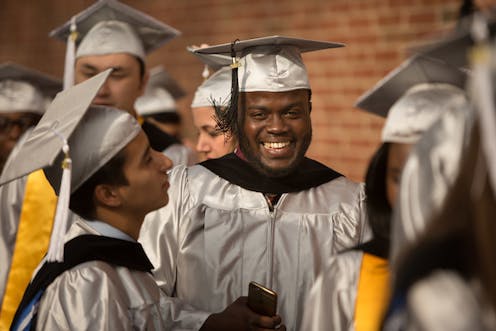Students who plan to seek more education than needed for their career earn more money
Students who plan to get more education than is required for the career they hope to have end up earning higher salaries as a result, a new analysis shows.

When it comes to career success, it pays to aim for more education than what you need for the job you want.
That is the key finding of a new study that I and several colleagues did by analyzing the salaries of high school students who expected to get more education than needed for their desired job. We compared their salaries to the salaries of students who planned to get only as much or less education than needed for their desired job.
Prior research had already shown that high school students who have a profession in mind and know what sort of education they need for that profession – what is sometimes referred to as “aligned ambitions” – secured more stable careers and higher wages early in their careers.
As a researcher who studies the impact college enrollment has on future earnings, I’ve discovered an additional payoff when students have what we might call “over-aligned” ambitions – that is to say, they expect to get more education than what they need for their desired career.
For example, suppose a student aspired to become a police officer or a banker. At the time the students in our study were in high school – 1979 – those careers required only a high school diploma, which is still pretty much the case today. However, students who planned on those careers and planned to go to a four-year college ended up making substantially more money per year than others who aspired to the same occupation but did not plan as much education.
Long-term payoffs
To reach this conclusion, we used data from a national sample. Starting in 1979, the survey asked young people how much education they expected to finish and what career they aspired to have at age 30, then followed them into their careers over the next few decades.
In analyzing these data, we identified three groups: Students who planned to get less education than they needed for the job they wanted; students who planned to get enough education for the job they wanted; and those whose educational goals were bigger than they needed to be.
What we discovered is that students whose educational goals were too low in relation to their career goals earned the least. By age 33 to 45, those whose education goals were well aligned with their career goals earned 4% more than this first group. But students who were overly ambitious – planning to take on studies that weren’t required by the jobs they wanted – actually did best, earning 11% more than the least educationally minded peers. This is based on an index used to measure wages and occupational prestige.
These benefits extend through a person’s mid-40s.
You might wonder if those who planned to get more education actually did so. In our analysis, we found that 75% of those who planned to get more education than needed for their planned careers actually got it. We also found that high school students who planned to have more education than required for their aspired job are more likely to graduate from four-year colleges.
Aspiring for more
These findings show the importance of high school students having information about how much education is necessary for certain careers, as well as aiming for more education than is necessary.
Do these findings about high school students from 1979 apply to today’s high school students? In my opinion, the answer is yes.
Students with high educational ambitions are more likely to attend and complete college than those with low educational ambitions, and college completion is likely to increase a student’s future earnings.
In addition, as the education requirements of the workplace have risen, students are more in danger of finding themselves lacking the necessary skills and credentials for the careers they want. Students who complete more education than is needed still get the skills they need, while leaving themselves open to more lucrative and prestigious career options.
Students can get job information from parents or other relatives. Or it could come from school counselors and teachers. School counselors, however, are often stretched thin and have more responsibilities than just helping students figure out their education and career options.
Students should also have access to the high school coursework they need to pursue the college major they choose. However, students in schools that serve high proportions of minority students sometimes lack access or aren’t counseled, encouraged or prepared to enroll in STEM or advanced math coursework, which is likely to increase a student’s chances of going to college. Even when schools do offer a wide array of courses, minority students are often placed in lower-track courses.
This is especially problematic because we found that minority students reap some of the largest benefits from having high educational and career ambitions. For example, we found that Hispanic students saw 13% higher wages when they expected to obtain more education than needed for their desired career.
Planning coursework is a process that schools and parents should start early. This is because the courses students take in middle school and early high school can determine if they are able to get into higher-level and more specialized classes. For instance, research has shown that taking more advanced math and science increases the likelihood of going to college. It also leads to higher wage earnings.
Finally, mindset programs can help students envision their futures and persist through setbacks. This is important so that students who have higher expectations for education can actually realize them.
Getting students to want more education is not just something that will make them better educated. My research shows that it will lead them to earn more money as well.
[ Like what you’ve read? Want more? Sign up for The Conversation’s daily newsletter. ]
This work was supported by the National Science Foundation (#1316702) and Office of the John A. Hannah Chair in the College of Education at Michigan State University.
Read These Next
The greatest risk of AI in higher education isn’t cheating – it’s the erosion of learning itself
Automating knowledge production and teaching weakens the ecosystem of students and scholars that sustains…
‘Learning to be humble meant taming my need to stand out from the group’ – a humility scholar explai
Humility is a virtue that many people admire but far fewer practice. A scholar describes how a professional…
Russia tested NATO’s airspace 18 times in 2025 alone – a 200% surge that signals a dangerous shift
With each year of the Ukraine-Russia war, Moscow has upped its violations of neighboring states’ airspace…






